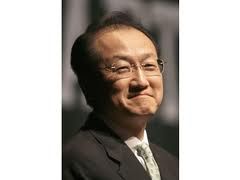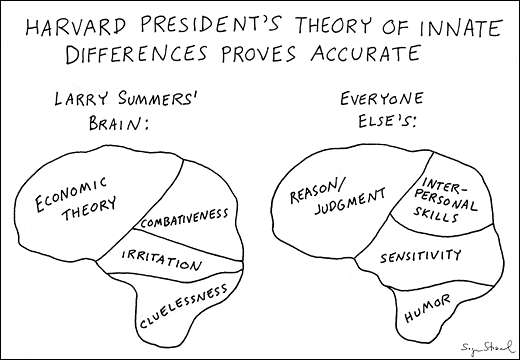Cross posted from The Stars Hollow Gazette
In a surprise announcement President Barack Obama nominated Dartmouth College President Jim Yong Kim to head up the World Bank:
 Dr. Kim’s name was not among those widely bandied about since Mr. (Robert B.) Zoellick announced his plans to move on last month. Highly respected among aid experts, Dr. Kim is an anthropologist and a physician who co-founded Partners in Health, a nonprofit that provides health care for the poor, and a former director of the department of H.I.V./AIDS at the World Health Organization. [..]
Dr. Kim’s name was not among those widely bandied about since Mr. (Robert B.) Zoellick announced his plans to move on last month. Highly respected among aid experts, Dr. Kim is an anthropologist and a physician who co-founded Partners in Health, a nonprofit that provides health care for the poor, and a former director of the department of H.I.V./AIDS at the World Health Organization. [..]
Dr. Kim, who was awarded a prestigious MacArthur Fellowship in 2003, was born in Seoul, South Korea, in 1959 and moved with his family to the United States when he was 5. He graduated from Brown University in 1982, earned an M.D. from Harvard University in 1991 and received a Ph.D. in anthropology there in 1993.
He was the first Asian-American to head an Ivy League institution when he took the Dartmouth post in 2009.
While working with Partners in Health in Lima, Peru, in the mid-1990s, Dr. Kim helped to develop a treatment program for multidrug-resistant tuberculosis, the first large-scale treatment of that disease in a poor country. Treatment programs for multidrug-resistant tuberculosis are now in place in more than 40 nations, according to Dr. Kim’s biography on Dartmouth’s Web site. He Kim also spearheaded the successful effort to reduce the price of the drugs used to treat this form of tuberculosis.
The United States traditionally selects the head of the World Bank and Europe the leader of its sister institution, the International Monetary Fund, since they were founded during World War II.
Apparently, Dr. Kim was suggested by former President Bill Clinton and Secretary of State Hillary Clinton, who was present with the President and Dr. Kim at the Rose Garden press conference. Though Dr. Kim will certainly be the front runner for the position, he isn’t the only candidate:
Angola, South Africa and Nigeria put forward Ngozi Okonjo-Iweala, the Nigerian finance minister and former World Bank official.
José Antonio Ocampo, the former finance minister of Colombia and a United Nations official, is rumored to be another candidate.
Jeffrey Sachs, the development economist and director of the Earth Institute at Columbia University, has put himself forward for the position.
If there are more than three candidates, the board will announce a “short list” and the new head will be named in time for the April meeting of the World Bank and the International Monetary Fund.
Dr. Kim is an excellent choice with experience in global development and management. He is well known and well liked. We wish him luck.


 Dr. Kim’s name was not among those widely bandied about since Mr. (Robert B.) Zoellick announced his plans to move on last month. Highly respected among aid experts, Dr. Kim is an anthropologist and a physician who co-founded Partners in Health, a nonprofit that provides health care for the poor, and a former director of the department of H.I.V./AIDS at the World Health Organization. [..]
Dr. Kim’s name was not among those widely bandied about since Mr. (Robert B.) Zoellick announced his plans to move on last month. Highly respected among aid experts, Dr. Kim is an anthropologist and a physician who co-founded Partners in Health, a nonprofit that provides health care for the poor, and a former director of the department of H.I.V./AIDS at the World Health Organization. [..] If there could possibly be a worse choice to head the World Bank when Robert Zoellick’s term expires later this year, I am sure that President Obama would find him or her. The rumors are that the president has decided to leave his “mark” on that banking institution by nominating Larry Summers for the position. Yes, that Larry Summers of the Harvard president of misogyny fame who was chief architect of banking deregulation that led to the repeal of Glass – Stiegel during the Clinton, that begat our current financial crisis. The Larry Summers who dismissed out of hand the suggestion that a bigger stimulus package would do more to boost the economy most likely because it was a woman, Christine Roemer, who proposed it.
If there could possibly be a worse choice to head the World Bank when Robert Zoellick’s term expires later this year, I am sure that President Obama would find him or her. The rumors are that the president has decided to leave his “mark” on that banking institution by nominating Larry Summers for the position. Yes, that Larry Summers of the Harvard president of misogyny fame who was chief architect of banking deregulation that led to the repeal of Glass – Stiegel during the Clinton, that begat our current financial crisis. The Larry Summers who dismissed out of hand the suggestion that a bigger stimulus package would do more to boost the economy most likely because it was a woman, Christine Roemer, who proposed it.